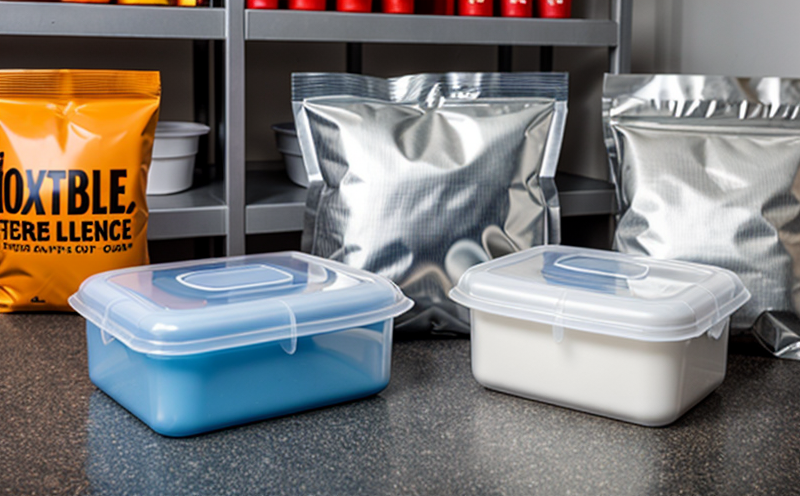ASTM D882 Tensile Properties of Thin Plastic Sheeting
The ASTM D882 standard is a critical benchmark used in the packaging industry to determine the tensile properties, including strength and elongation at break, of thin plastic films. This test method ensures that flexible packaging materials meet the necessary performance requirements for safety and quality assurance.
The tensile testing process involves the application of controlled stress until failure occurs. The specimen, typically cut from a roll or sheet, is clamped in a tensile testing machine. The machine measures how much force is required to stretch the sample until it breaks. This data provides essential information about the mechanical integrity and reliability of the packaging material.
ASTM D882 specifies that the samples should be oriented along the machine direction (MD) for accurate results. MD orientation aligns with the direction of the film's production, ensuring consistency in testing outcomes. The standard also recommends specific dimensions and tolerances for the specimens to ensure uniformity across tests.
Understanding the tensile properties is crucial because it helps manufacturers identify potential weaknesses or strengths in their materials. For instance, a high elongation value indicates that the material can stretch significantly before breaking, which is desirable in flexible packaging to accommodate variations in product size and shape. Conversely, if the elongation is too low, it may indicate brittleness, leading to premature failure during use.
The tensile strength of thin plastic sheeting provides insight into its resistance to tearing under stress. This parameter is vital for ensuring that the packaging can withstand the pressures exerted during filling, handling, and transport without compromising the integrity of the contents or the package itself. Additionally, it helps in optimizing material usage by providing a balance between cost-effectiveness and performance.
Another important aspect of ASTM D882 testing is the measurement of the modulus of elasticity (also known as Young's modulus). This parameter indicates how much a material deforms under stress before returning to its original shape. A higher modulus value suggests that the material has more resistance to deformation, which can be beneficial for maintaining structural integrity during packaging processes.
The standard also covers the impact of environmental factors on test results. Factors such as temperature and humidity can significantly affect the tensile properties of plastic materials. Therefore, it is crucial to conduct tests under controlled conditions that mimic real-world storage and usage environments. This ensures that the testing accurately reflects the material's performance in practical applications.
ASTM D882 compliance plays a pivotal role in ensuring product safety and regulatory adherence. By adhering to this standard, manufacturers can demonstrate that their products meet international quality and safety standards. This is particularly important for companies operating globally or those seeking certification from third-party organizations like ISO 9001.
Furthermore, the results of ASTM D882 tests are crucial inputs in the design and optimization of packaging systems. Engineers use these data points to make informed decisions about material selection, process improvements, and quality control measures. The test provides a quantitative measure that can be used for continuous improvement in product development.
In summary, ASTM D882 testing is a robust tool for evaluating the tensile properties of thin plastic sheeting. It offers valuable insights into the mechanical performance of packaging materials, enabling manufacturers to ensure product quality and safety while meeting regulatory requirements.
Benefits
The benefits of ASTM D882 testing extend beyond just compliance with industry standards. These tests provide critical information that aids in several aspects of packaging development:
- Improved Quality Control: Ensures consistent quality by identifying variations in material properties.
- Enhanced Safety: Guarantees that the packaging will not fail under expected conditions, protecting both products and consumers.
- Cost Efficiency: Helps to optimize material usage by selecting appropriate thicknesses without sacrificing performance.
- Better Product Design: Enables engineers to make informed decisions about material selection and process improvements.
- Regulatory Compliance: Meets international standards, facilitating easier market access and compliance with local regulations.
Incorporating ASTM D882 testing into your quality management system not only enhances product reliability but also fosters a culture of continuous improvement within the organization. It is an essential step in maintaining high standards of packaging excellence.
Customer Impact and Satisfaction
The results from ASTM D882 tensile tests have tangible impacts on customer satisfaction:
- Enhanced Trust: Customers can trust that the products are safe and reliable due to rigorous testing.
- Better Product Protection: Packages designed with this data provide better protection for the contents, reducing damage during transport or handling.
- Aesthetic Appeal: Stronger packaging materials can be used without compromising on aesthetics, ensuring products look appealing from the shelf.
The data obtained from these tests help in addressing customer concerns directly. By demonstrating commitment to quality and safety through such rigorous testing, companies can build stronger relationships with their customers. This leads to increased loyalty and repeat business, which is crucial for long-term success in the competitive packaging industry.
Environmental and Sustainability Contributions
The ASTM D882 test method also contributes positively to environmental sustainability:
- Reduced Waste: By optimizing material usage, companies can reduce the amount of waste generated during production processes.
- Eco-Friendly Packaging: Understanding tensile properties helps in creating packaging that is more durable yet lightweight, reducing the overall environmental footprint.
- Energy Efficiency: Materials that perform well under stress can lead to more efficient manufacturing processes, potentially saving energy and resources.
Incorporating sustainable practices into product development is increasingly important for businesses. By leveraging ASTM D882 testing results, companies can make informed decisions about material selection that align with their environmental goals. This not only benefits the company but also contributes to broader sustainability initiatives in the industry.





